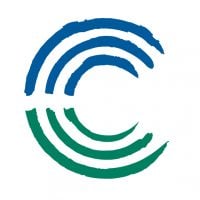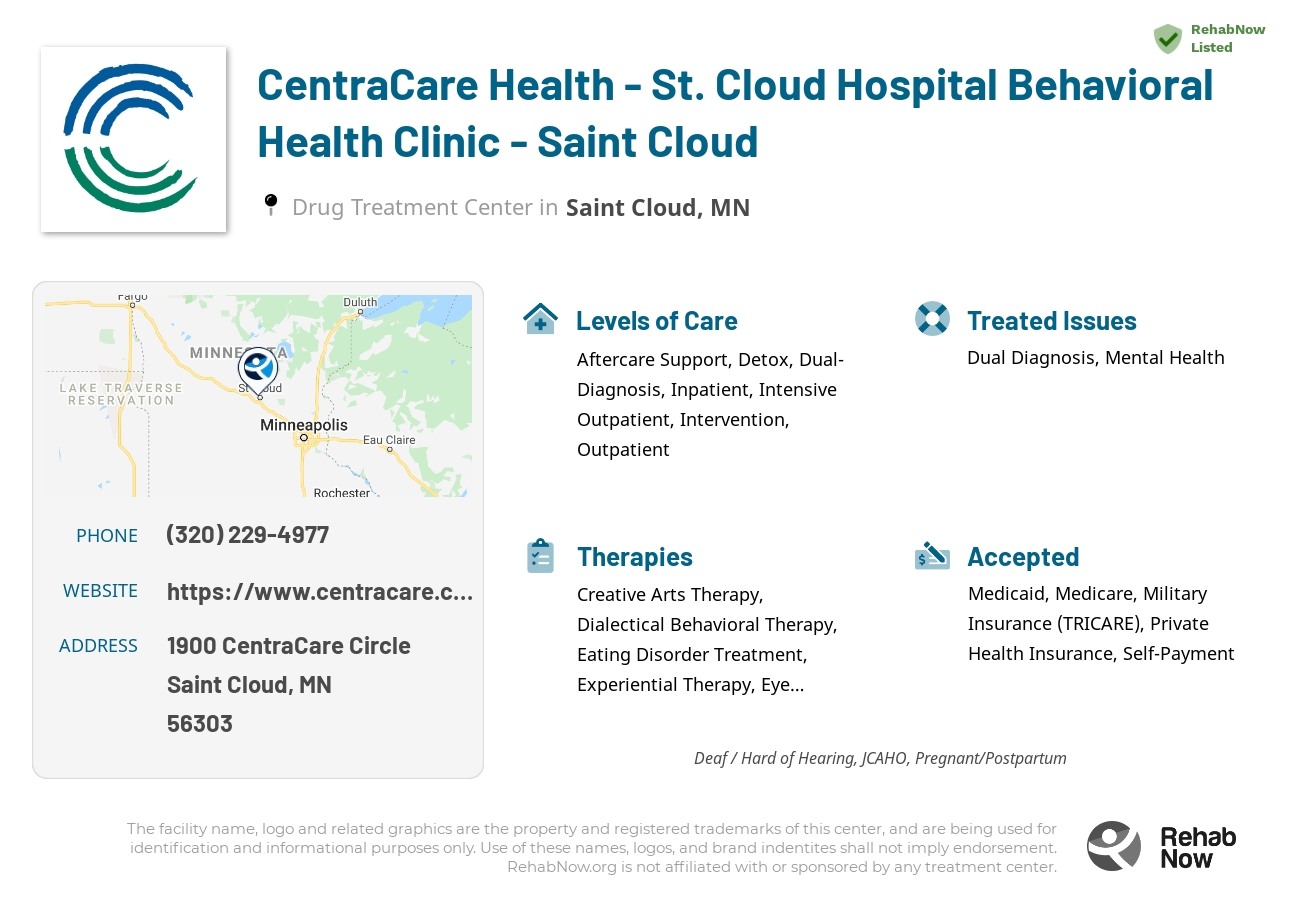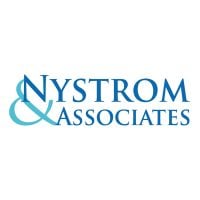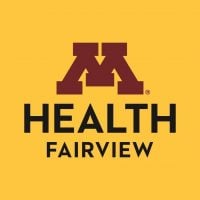CentraCare Health - St. Cloud Hospital Behavioral Health Clinic - Saint Cloud
Drug Rehab Center in Saint Cloud, Minnesota
CentraCare Health - St. Cloud Hospital Behavioral Health Clinic in Saint Cloud, Minnesota offers a wide range of mental health services and specialized addiction treatment programs, using evidence-based practices and interventions, to individuals and families of all ages.
About CentraCare Health - St. Cloud Hospital Behavioral Health Clinic - Saint Cloud in Minnesota
CentraCare Health - St. Cloud Hospital Behavioral Health Clinic, located in St. Cloud, Minnesota, offers a specialized focus on substance abuse and addiction treatment for both children and adults. This facility stands out due to its comprehensive approach to mental health and addiction therapies, including individual, family, and group counseling.
As a Joint Commission accredited clinic, it adheres to high standards of care and treatment for mental health disorders and substance abuse. The clinic's commitment to utilizing evidence-based practices and individualized treatment plans ensures a tailored approach to recovery for each patient.
- Offers a wide range of specialized services for addiction and substance abuse, including outpatient and residential programs.
- Utilizes evidence-based practices and interventions to develop personalized treatment strategies.
- Accredited by the Joint Commission, reflecting its commitment to healthcare excellence and patient safety.
CentraCare Health - St. Cloud Hospital Behavioral Health Clinic addresses various addictions and related issues through an array of treatment modalities. These include psychiatric care, medication management, and comprehensive evidence-based programs, offered through both outpatient and intensive outpatient services.
Genders
Ages
Modality
Additional
Accreditations

JCAHO
Conditions and Issues Treated
Dual Diagnosis treatment centers like CentraCare Health - St. Cloud Hospital Behavioral Health Clinic - Saint Cloud provide this treatment tailored to the patient’s specific needs, and they also have a specialized focus on addiction treatment. Drug and alcohol addiction often coexists with another mental illness, such as depression or schizophrenia. In other words, drug addiction is only a symptom of a deeper problem.
When addiction enters into the picture, it can often lead to dangerous consequences in the addict’s life. For example, when addiction is paired with major depression, it can lead to suicidal thoughts or actions. When someone is addicted to drugs or alcohol, they often experience a failure to control their impulses and difficulty decision-making.
Dual diagnosis for drug addicts can be very effective when treating drug addiction in Saint Cloud, MN.
Levels of Care Offered
This center offers a variety of custom treatment tailored to individual recovery. Currently available are Aftercare Support, Detox, Dual-Diagnosis, Inpatient, Intensive Outpatient, Intervention, Outpatient, with additional therapies available as listed below.
Detox is the body’s process of removing toxins. In substance abuse, detox refers to the process of getting rid of drugs already present in the system once the patient stops further intake. Detox is the initial recovery step. Physiological drug dependence over time can lead to symptoms of withdrawal. Depending on the symptom severity, the detox process is managed either medically or clinically. While medically assisted detox relies on specific medicines, clinical or social detox relies on providing the patient with emotional and psychological support.
The inpatient rehab at CentraCare Health - St. Cloud Hospital Behavioral Health Clinic - Saint Cloud promises an intense and effective treatment. Inpatient rehabs are particularly recommended for those with a severe addiction to drugs. Detoxing at a rehab center ensures that the patient receives 24-hour medical supervision to ensure the best possible chance of recovery. Medical staff is readily available to intervene in case of withdrawal symptoms or other complications. This is not the case with outpatient treatment, where patients may be discharged after the detoxification process is complete.
Inpatient facilities provide residential and holistic treatment, with access to experienced medical professionals and rehab specialists. This ensures the best possible recovery and is recommended for patients with severe addiction seeking drug treatment.
Intensive Outpatient Programs (IOPs) are a form of drug treatment that allows individuals to receive the therapy they need while remaining in their homes and community. IOPs allow for the flexibility to continue working and living at home while still meeting treatment demands.
Outpatient treatment programs are less intensive than an inpatient program. Participants live at home while working or going to school. Benefits include being able to continue relationships with family, friends, and work/studies. Treatment includes educating patient on addiction to drugs, medication, and counseling. Benefits include being able to continue relationships with family, friends, and work/studies. Treatment includes educating patient on addiction to drugs, medication, and counseling. Counseling sessions are for either individual or group.
Drug rehab intervention aims to make sure patients understand the risks of their addiction and possible outcomes if they continue their behavior. They must learn how their addiction affects those around them and allow a therapy session to help move past the physical symptoms.
Interventions are used in drug rehab to help patients overcome their addiction to drugs. They often include psychotherapy or behavioral therapy, group therapy, family counseling, and peer support. Each intervention is designed to provide a unique perspective of how the addiction occurs and what can be done to stop it.
Aftercare Support in drug rehab is crucial because it helps people stay sober after treatment. The benefits of Aftercare Support are that it provides a pathway that will help people get sober for life. It supports healing at all levels, physical, mental, emotional, and spiritual.
Therapies & Programs
Individualized Treatment is essential because it gives addicts the ability to participate in a program that meets their unique needs. An addict should work with professionals who understand what they’re going through, especially if the addict is actively using.
Trying to find a treatment program that meets your needs can be challenging. It’s even more complicated if you don’t know what kind of treatment you need. Being able to have professionals who are experienced with treating your situation is key to getting sober. Finding the right treatment program for an addict is difficult, but it’s even harder without communicating with those who have experience treating your specific situation.
Family dysfunction can often be the underlying cause of substance abuse. To get sober, you need to find a different way to cope with the pain in your life. Family therapy can help you and your family deal with old issues that may trigger substance abuse. It will help everyone understand why each member of the family feels and acts the way they do. It can give everyone new tools to manage their emotions so that they don’t want to drink or do drugs.
A person looking for drug recovery should know that group therapy is an essential tool. Group therapy provides accountability and friendship to people with addiction. It is recommended as a lifetime treatment habit. Group therapy occurs in a group setting as opposed to a one-on-one setting. It benefits patients by providing a feeling of support and letting them know they are not alone. Patients at CentraCare Health - St. Cloud Hospital Behavioral Health Clinic - Saint Cloud also learn to build trust and understanding and gain perspective through discussions.
If you are looking for a drug addiction treatment program that also provides trauma therapy, then CentraCare Health - St. Cloud Hospital Behavioral Health Clinic - Saint Cloud in Saint Cloud, MN is a great option. The staff at this facility specialize in helping people process and understand the past traumas that have led them to addiction. This approach can help individuals move forward with their recovery and take a better hold of their sober future.
The benefits of trauma therapy at CentraCare Health - St. Cloud Hospital Behavioral Health Clinic - Saint Cloud in Saint Cloud, MN are as follows:
- People will become less likely to engage in self destructive behaviors.
- Their emotional and mental health will significantly improve.
- They will be more confident in their abilities to live an addiction-free life.
- People will be able to connect with other people on a deeper level.
- Their problems with intimacy and trust will improve.
Dialectical behavior therapy is a type of cognitive-behavioral therapy that focuses on eliminating specific negative thoughts that can potentially lead to an individual inflicting self-harm. It helps treat patients exhibiting uncontrollable emotions, intense mood swings, and borderline personality disorders.
The term “dialectic” means the integration of opposites. In the substance abuse context, dialectical behavior therapy refers to accepting the patient’s addiction and changing their thoughts and behavior. It improves life skills such as controlling intense emotions without reacting impulsively, resolving interpersonal conflicts effectively, and promoting awareness about self and others.
Eye Movement Desensitization and Reprocessing (EMDR) is an integrative psychotherapy approach that has been extensively studied and proven effective for treating trauma. EMDR is a set of standardized protocols that incorporates elements from many different treatment approaches. EMDR therapy promotes information processing of external stimuli, memories, thoughts, and feelings. EMDR sessions typically last 50-90 minutes and can be completed in as little as 12-15 sessions. However, many individuals with chronic trauma histories require more than 50 EMDR sessions to achieve significant symptom relief.
EMDR therapy treats individuals, children, and adults of either gender exposed to one or more traumatic events. EMDR cannot cause someone to forget details of the traumatic event(s), nor does EMDR focus on exploring the past trauma(s). EMDR has been demonstrated effective for survivors of various traumas, including accidents, natural disasters, violent crimes, sexual abuse, and combat stress.
EMDR is most effective when the client has completed a thorough psychiatric evaluation to rule out or treat any co-existing mental health problems. EMDR therapy does not involve hypnosis or abreaction (catharsis) of traumatic memories. EMDR is a goal-directed therapy in which the client works with the therapist to develop an individualized treatment plan that focuses on specific trauma memories and associated disturbance.
Life skills training is beneficial for addicts in recovery because it helps them learn how to take care of themselves and improve their quality of life, which can promote feelings of purpose and motivation.
This type of treatment works by teaching individuals life-enhancing skills that support positive living, including:
- Healthy lifestyle habits
- Skills to effectively manage stress
- Effective communication skills to help them get their needs met without turning to drugs or alcohol
- Money management and budgeting skills so they can continue to take care of themselves after treatment ends.
Thinking about nutrition is an odd thing when you’re strung out. You are probably so low physically that all you want to do is sleep, eat comfort food and get high again. It’s hard to imagine having enough energy to care about what kind of food you are eating but think about it. Your body has gone through some severe physical stress, so it is vital to give it the building blocks it needs to recover. It’s equally important to remember that malnutrition can affect your mood and energy level, which affects your desire to get sober.
If you’re eating right, you’ll have more energy for productive activities, such as going to meetings or being with other sober people in Saint Cloud, Minnesota. You’ll have more strength to fight cravings, and you won’t be so low that they are overwhelming. You will think clearly enough to make sober decisions. Finally, good nutrition helps keep your body strong against the familiar ravages of drug use–tuberculosis, hepatitis, abscesses, infections, etc.—as well as the physical symptoms of withdrawal.Nicotine replacement therapy can help addicts reduce or eliminate their cravings for nicotine. By replacing the harmful substances in tobacco with less potent chemicals, most smokers can gradually wean themselves off cigarettes without experiencing intense cravings.
During these sessions, a therapist will work with the addict to gradually reduce their dependence on nicotine by controlling how much they smoke and providing appropriate breaks between cigarettes. Using this type of therapy in combination with other strategies can help smokers learn how to quit smoking for good and avoid relapse.
Patient Experience
Creative Arts
In Creative Arts Therapy for addicts, the final product matters far less than the experience of creation and expression itself. It is believed that enhancing creativity and developing skills related to it can help people recover faster. Activities such as painting, writing, acting, and dancing are considered therapeutic and hosted and managed by CentraCare Health - St. Cloud Hospital Behavioral Health Clinic - Saint Cloud in Saint Cloud, MN. They become outlets for patients to blow off steam, channel their emotions, and express their thoughts and feelings.
Experiential Therapy at CentraCare Health - St. Cloud Hospital Behavioral Health Clinic - Saint Cloud
Experiential therapy is a type of therapy that has been found to be effective in the treatment of substance abuse. It is a “hands-on” approach, which can involve anything from acting to rock climbing. The individual must trust the therapist for this therapy to work. This therapy helps individuals revisit and heal from past traumas and has been used in various behavioral and eating disorders.
Payment Options Accepted
For specific insurance or payment methods please contact us.
Is your insurance accepted?
Ask an expert, call (888) 674-0062
CentraCare Health Associated Centers
Discover treatment facilities under the same provider.
- CentraCare Health - St. Cloud Hospital Behavioral Health Clinic - Sartell in Sartell, MN
- CentraCare Health - St. Cloud Hospital Recovery Plus in Saint Cloud, MN
- CentraCare Health - Clara's House in Saint Cloud, MN
- CentraCare Health - Passages in Saint Cloud, MN
- CentraCare Health - Recovery Plus Adolescent in Saint Cloud, MN
Learn More About CentraCare Health Centers
Additional Details
Specifics, location, and helpful extra information.
Saint Cloud, Minnesota 56303 Phone Number(320) 229-4977 Meta DetailsUpdated April 15, 2024
Staff Verified
CentraCare Health - St. Cloud Hospital Behavioral Health Clinic - Saint Cloud Patient Reviews
There are no reviews yet. Be the first one to write one.
Saint Cloud, Minnesota Addiction Information
Minnesota is fighting an opioid epidemic that is leaving hundreds of its residents dead each year. Both prescription opioids and illicit opioids are widely abused in the Land of 10,000 Lakes. Heroin continues to be one of the most commonly abused drugs in the state, if not the most common illicit drug. Over 10% of all treatment admissions in Minnesota list heroin as their drug of choice.
Saint Cloud, Minnesota, has a moderate drug addiction problem. According to 2015 statistics, 9.4% of Saint Cloud residents reported past-month use of illicit drugs, and 16.3% of residents reported binge drinking in the past month. The most common drugs involved in overdoses were opioids (heroin and prescription painkillers). Some common treatment approaches used in Saint Cloud include cognitive-behavioral therapy, motivational interviewing, and 12-step programs.
Treatment in Nearby Cities
- Long Prairie, MN (41.8 mi.)
- North Branch, MN (59.0 mi.)
- Sandstone, MN (74.8 mi.)
- Rochester, MN (137.8 mi.)
- Virginia, MN (155.9 mi.)
Centers near CentraCare Health - St. Cloud Hospital Behavioral Health Clinic - Saint Cloud
The facility name, logo and brand are the property and registered trademarks of CentraCare Health - St. Cloud Hospital Behavioral Health Clinic - Saint Cloud, and are being used for identification and informational purposes only. Use of these names, logos and brands shall not imply endorsement. RehabNow.org is not affiliated with or sponsored by CentraCare Health - St. Cloud Hospital Behavioral Health Clinic - Saint Cloud.







